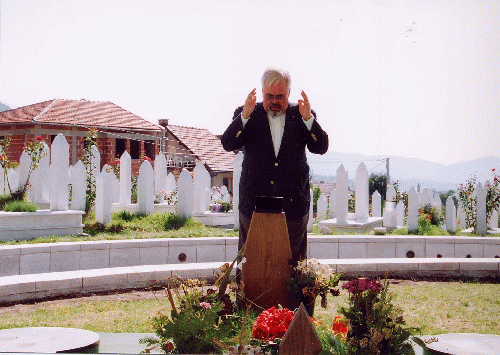
The author at the temporary gravesite of Bosnia-Hercegovina President Alija Izetbegovic
(Image by Center for Islamic Pluralism/Stephen Schwartz) Details DMCA
Most Americans have never heard of it, doubtless including Trump.
Unlike 29-member NATO, which Trump loathes, OSCE has 57 members, based on an ambiguous definition of Europe. Also unlike NATO, headquartered in Brussels (with the European Union), OSCE operates from Vienna, Austria.
NATO brings together democracies, for which Trump has contempt.
OSCE comprises tyrannical and corrupt regimes, including Russia, Belarus, Moldova, Armenia, Azerbaijan, Kazakhstan, Uzbekistan, Turkmenistan, and Tajikistan. These mafia dictatorships are on the roster of OSCE because the entity was established when the Soviet Union loomed over Western Europe. Was the Soviet Union ever "European?" Is Russia "European?"
What next? That is the eternal question in times like these.
The esteemed Balkan Investigative Reporting Network (BIRN) has disclosed the extensive employment of Serbian terrorists, whose record of carnage shocked the world in the 1990s, in the attack of the Putin Blue Horde on eastern Ukraine. Ukrainophobia motivates Blue Putin in his use of Trump.
BIRN revealed that eight Blue Putin units killing innocent Ukrainian citizens have Serbian members. This makes sense, in that Russia's playbook in Ukraine reproduces exactly that used by Milosevic in ex-Yugoslavia, as well as by Moscow in Mongolia, Spain, the Baltic states, Europe after World War II, Korea, Indochina, Afghanistan, Bulgaria, the Caucasus, Armenia, the Caribbean, Central America, Africa, and now, the U.S. Indeed, Marx and Bakunin observed the same Kremlin methods at work throughout the 19th century.
With its climate conditions, Russia cannot develop a major economy, and must eternally cannibalize its neighbors and rivals. It is a global parasite - an image Russia assigns falsely to America, Germany, Israel, and the Vatican.
OSCE has maintained an unarmed, civilian Special Monitoring Mission to Ukraine since 2014. But much like other political restraints on Russia, it is a weak reed. In this respect, OSCE maintains the pattern it has followed, and which I observed close-up, in Bosnia-Hercegovina, Kosovo, and Uzbekistan.
I well remember how Western gadflies portrayed OSCE as a savior of peace in the Balkans and aid to democracy in Central Asia. How anything positive could have been expected from a body in which Russia has so prominent a role may now seem dubious, but the whole world then imagined a future for the Muscovite realm as a democracy, thanks to Mikhail Gorbachov, and THE NEW YORK TIMES portrayed Milosevic at first as a Serbian reformer, much as it later did MbS.
OSCE betrayed the democratic principles honored by the West. As I witnessed its behavior in Sarajevo, Prishtina (the Kosovo capital), and Tashkent, it resembles a paper garment worn in rain. It does nothing to broaden, and in many places restricts democracy.
Sarajevo was long a major cultural center in ex-Yugoslavia, and with the fall of communism and rollback of Russo-Serbian imperialist aggression, journalism flourished. Kosovar Albanian media leaders led the struggle against Serbofascism; many were forced abroad but they returned after the NATO liberation of 1999 and nurtured a media scene any advanced country could envy.
But I watched as OSCE functionaries, over my objections as a journalist and activist in journalists' unions, battered Bosnian and Kosovar Albanian media workers. These campaigns to denigrate the professionalism, ethics, and identity of Balkan reporters had no rational basis.
One participant in the OSCE's policymaking in Bosnia-Hercegovina was an American, Tanya L. Domi, now an Adjunct Assistant Professor of International and Public Affairs at Columbia University's School of International and Public Affairs and is an affiliate faculty member of the Harriman Institute. Domi's official biography describes her previous policy work in Bosnia and Herzegovina "implementing the Dayton Peace Accords for the OSCE Mission 1996-2000, she served in the position as Counselor to U.S. Ambassador Robert Barry and as Chair of the OSCE Media Experts Commission."
Present in Sarajevo at that time, I observed Domi and her pursuit of international policy in the Balkans. I watched as she and her colleagues undercut the authority of media enterprises like the outstanding Sarajevo daily OSLOBODJENJE (Liberation). She and her cohort interfered persistently with the reconstruction of television news in Bosnia,
(Note: You can view every article as one long page if you sign up as an Advocate Member, or higher).




